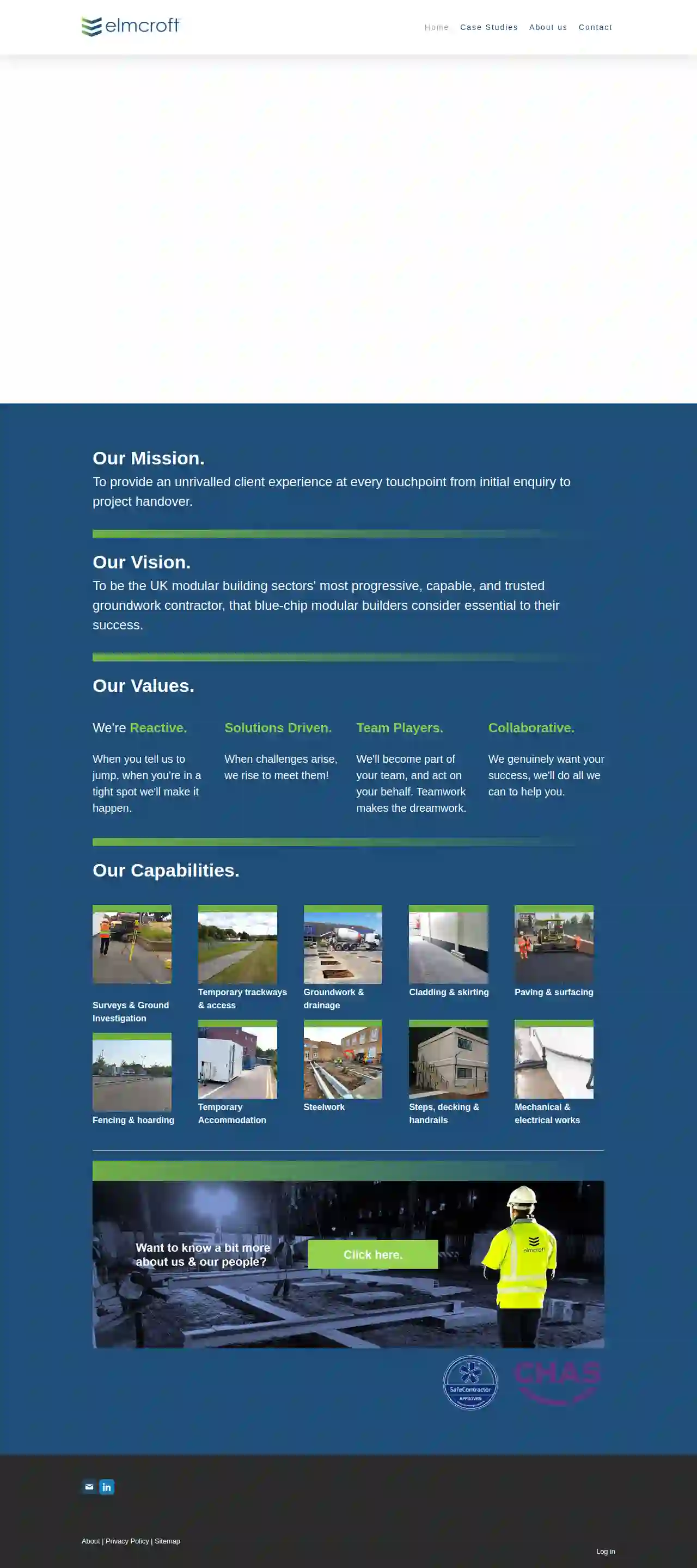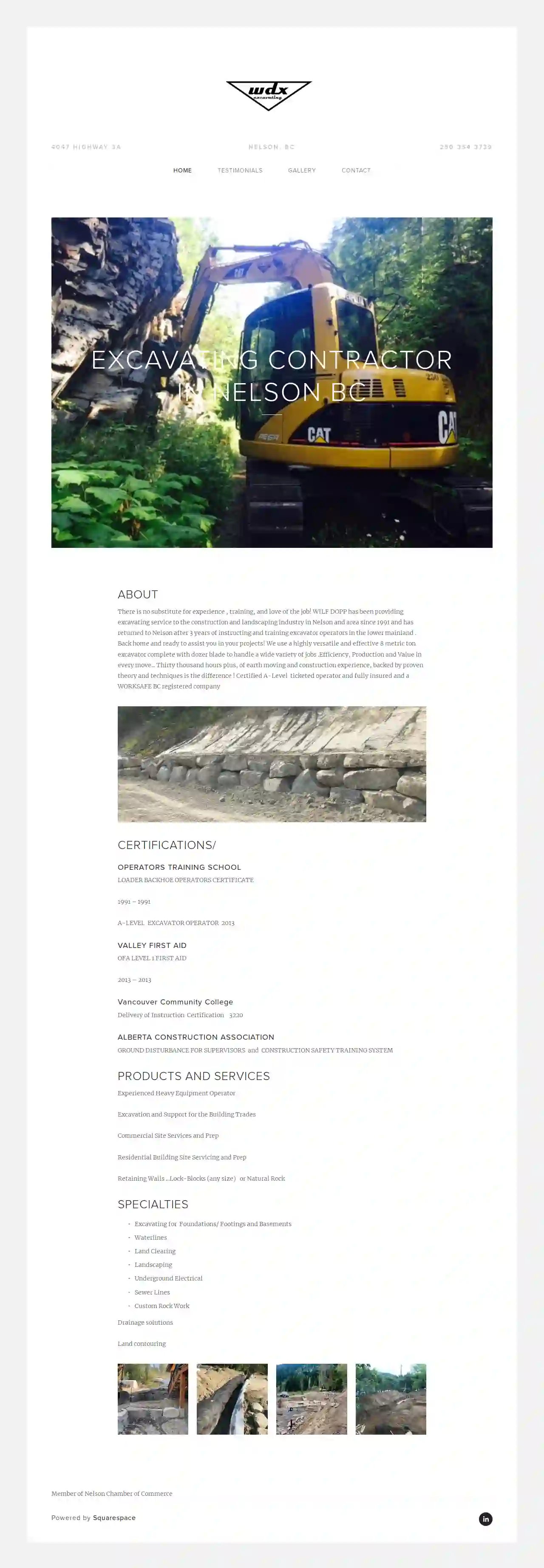Demolition Contractors Heywood
Find top Demolition Contractors Near Me in Heywood
Receive 3 FREE Demolition Companies quotes for your project today! Compare profiles, reviews, accreditations, portfolio, etc... and choose the best service.

Keystone Construction
1Edinburgh, GBWelcome to Keystone Construction A Specialist Groundworks Contractor Based in Scotland About Us Keystone Construction is a professional groundworks contractor, based in Edinburgh and working with partners throughout Scotland. What Keystone Can Do For You At Keystone Construction, we pride ourselves on delivering projects to the highest possible construction standards, in an efficient, cost-effective way. We are accomplished in a diverse range of groundworks specialities including: Groundworks Services We offer a comprehensive range of groundworks services, including: Earthworks / Clearance Site Clearance Bulk Cut & Fill Bulk Soil Import / Export Ground Remediation Foundations Strip, Pad & Raft Foundations Deep Pile Foundations Complex Engineered Solutions Soil Improvements Concrete Works Suspended Floor Slabs Power-Floated Concrete Floors Retaining Walls Formwork, Reinforcing, Placing Plotworks Utility Installation Hard Landscaping Street Lighting Roads / Drainage / SUDS Road Formation & Surfacing SUDS Ponds All Concrete, Plastic & Clay Piping Deep Drainage & Access Chambers Building Blockwork & Underbuilding Superstructure Brick & Blockwork For Housing Developments If your next project requires any of the services above, feel free to get in touch to discuss your specific needs. Experience Matters Specialists in Complex Projects The team at Keystone Construction has a wealth of experience in delivering complex groundworks projects. We take pride in our ability to work in tight and confined spaces, for example, on sites in close proximity to water, sites with impeded access and projects involving listed buildings in areas of historical significance. This experience, together with a continuing investment in the latest plant, machinery & technology, makes Keystone Construction a compelling choice when it comes to complex groundworks projects.
- Services
- Why Us?
- Gallery
Get Quote
Pre-Construct Archaeology
4.29 reviewsThe Rope Works, Broadwood View, Chester-le-Street, Durham, DH3 3AFP, GBCelebrating 30 years of business Pre-Construct Archaeology PCA is a well-established independent archaeological company specialising in high quality, client focused heritage initiatives. READ MORE ABOUT PCA Discover our services PCA provides the full range of archaeological and built heritage services in all public and private sectors, such as property development, transport and renewable energy. We are able to undertake work anywhere in the UK, including contaminated sites. See our projects Get in touch With offices in Cambridge, Durham, London, Newark, Norwich, Warwick, and Winchester, we can help with your heritage requirements. Get in touch with Pre-Construct Archaeology in your local area or contact our general enquiries for advice.
- Services
- Why Us?
- Testimonials
- Gallery
Get Quote
Bespoke Builders York
1Rotherham, GBAbout South Yorkshire Building Network Your building project deserves the best … Highest standard project management and workmanship Carefully matched to existing building style and materials Compliant with building regulations and codes of practice. Members of the South Yorkshire Building Network can undertake any construction project in South Yorkshire, and nothing is too small or too complicated. Be it renovations, woodwork, bathroom and kitchen fitting, extensions and conversions, plumbing or joinery, our approved panel of building contractors are here to build your perfect home using the latest designs, highest quality materials and all of our expertise! Our experienced builders will complete each stage of your domestic or commercial project, from the conception of the plumbing and heating system to the decorations to complicated electrical wiring. If you are looking for local builders in South Yorkshire, get in touch today. Our members are competitively priced with an excellent track record of customer satisfaction.
- Services
- Why Us?
- Gallery
Get Quote
Clacton Pier
4.3Clacton Pier, 1 North Sea, Clacton-on-Sea, CO15 1QX, GBEXPLORE THE BIGGEST PLEASURE PIER IN EUROPE Clacton Pier is a vibrant and exciting destination for families and thrill-seekers alike. With a wide range of attractions, rides, and entertainment options, there's something for everyone to enjoy. From the exhilarating rides to the immersive Jurassic Pier experience, you're guaranteed an unforgettable day out. SMILES ALL THE WAY. SO MANY WAYS TO PLAY! Thrilling rides, arcade, golf and immersive attractions, every visit promises unforgettable memories. Don’t miss out on the excitement! Purchase your Daily Tickets, Big Day Out Band, Annual Passes or load up a Fun Card today for endless thrills and unforgettable fun at Clacton Pier.
- Services
- Why Us?
- Gallery
Get Quote
Masterhitch Europe Ltd
51 reviewsWhitewall Centre, Whitewall Road, Strood, Kent, ME2 4DZ, GBMasterhitch are leaders in the design and manufacture of a large range of excavator attachments, excavator buckets and parts for construction, earth-moving and demolition. Masterhitch are proud of their dedication to and quality of their products, with safety lying at the heart of all designs and products. The Masterhitch Hooker Hitch is the safest quick hitch in the world, specifically designed for ease of use as well as security, ensuring a bucket or attachment is impossible to drop off unintentionally when attached. Excavator buckets, attachments, guards and hitches can be manufactured to fit all makes and size of diggers and excavators. Masterhitch provide an extensive range of buckets and attachments including reversible forks, cradles, grapples, handlers, claws and rippers. Ram Guards can dramatically reduce the cost and downtime of repairing your machines rams. Masterhitch also provide expert bespoke design, repairs, cutting and manufacturing for client’s individual needs. The team of highly specialised and experienced staff can advise you on the right attachment or bucket for whatever your need.
- Services
- Why Us?
- Accreditations
- Gallery
Get Quote
Elmcroft Construction Ltd
55 reviews12 Greycaine Road, Watford, WD24 7GG, GBAbout Us When Peter Barnes founded Elmcroft in 1976 he had two objectives. Firstly to build a business that his sons could join when they were old enough, and secondly to give his clients excellent service. Fast forward to today - 48 years and counting later, his objectives have become reality! Our mission is to 'provide a frictionless groundwork & builders work package to the modular contractor, enabling them to offer turnkey solutions to their clients'. With a strong track record, commitment to client satisfaction & years of experience in our game, we continue to win projects on the strength of our reputation, & quality of our work. We'd love to year from you...! Our Leadership Our Story 1976 After leaving one of the large national construction companies of the time, Elmcroft Services is set up by Peter Barnes with a ladder and a set of paint brushes doing house painting and small building works. 1977 The year of the Queens silver jubilee & also the year Peter Barnes, purchased the first company van. A second hand Ford Escort van. 1978 Elmcroft start targeting primarily small domestic building works. 1981 Peter's 10 year old twin boys Colin & Keith start to join him on site, to give a helping hand and get their first taste of working in construction! 1982 Peter upgrades his company vehicle to a more spacious VW transporter. 1984 Elmcroft start to take on larger projects including more industrial & commercial construction works. 1985 Elmcroft take on their 1st employee, & purchase a Mercedes Sprinter van. 1986 Elmcroft hire three lock up garages to start storing equipment as it out-grows the garage at home. 1987 Peter's two sons leave school and join him in the business. Keith trains as a bricklayer & Colin as a carpenter. 1990 Elmcroft move into a new office - a basic log cabin in Peter's back garden! More employees join the company. Steady growth follows. 1994 The company purchases it's first excavator! 1996 The company has moved into their own freehold yard in Harrow for the storage of plant & equipment, and also purchase their own 7.5 tonne beaver-tail truck. 1998 Peter is taken ill and steps back from the day to day running of the business. Colin steps up and takes more responsibility for day to day running of the business. 2003 Management make the decision to move away from domestic work and focus exclusively on industrial & commercial construction. 2005 The company relocates offices to a larger space in Watford.
- Services
- Why Us?
- Testimonials
- Gallery
Get Quote
WDX Excavating
59 reviews4047 Highway 3A, Nelson, V1L 6N5, GBAbout WDX Excavating There's no substitute for experience, training, and a genuine love for the job! Wilf Dopp has been providing excavating services to the construction and landscaping industry in Nelson and the surrounding area since 1991. After spending three years instructing and training excavator operators in the Lower Mainland, Wilf has returned to Nelson, ready to assist you with your projects. We utilize a highly versatile and effective 8-metric ton excavator, complete with a dozer blade, to handle a wide range of jobs. Our commitment to efficiency, production, and value is evident in every move we make. With over 30,000 hours of earth-moving and construction experience, backed by proven theory and techniques, we stand out from the competition. Wilf is a certified A-Level ticketed operator, and WDX Excavating is fully insured and registered with WorkSafe BC.
- Services
- Why Us?
- Our Team
- Gallery
Get Quote
Driscoll and Crowley
51 reviews24 International House, Holborn Viaduct, London, EC1A 2BN, GBCertified Drain Surveys: Your Trusted Drainage Experts in London Certified Drain Surveys is a specialist and fully certified drainage surveying company serving the greater London region, including Essex, Kent, and Middlesex. We've been in operation for over 15 years, providing comprehensive drainage services to a wide range of domestic, commercial, and industrial clients. Our Commitment to Excellence Our reputation is built on our commitment to friendly, professional customer service and tailoring our services to meet your specific drainage needs. We pride ourselves on providing accurate CCTV drain survey reports and cost-effective estimates, ensuring you have all the information you need to make informed decisions. Experienced and Certified Team Our team of qualified engineers are highly skilled and professional, equipped with the latest technology to investigate your drains and sewers effectively. Each member of our team has an up-to-date DBS Check, ensuring safe and reliable service in all environments. Proud Members of the NADC We are proud members of the National Association of Drainage Contractors (NADC), membership number 502. This membership demonstrates our commitment to industry standards and best practices.
- Services
- Why Us?
- Accreditations
- Gallery
Get Quote
Realtime Civil Engineering Ltd
3.213 reviewsSwanley Bar Lane, Little Heath, Potters Bar, Hertfordshire, EN6 1NU, GBRealtime Civil Engineering Realtime Civil Engineering has been successfully trading since 1989 and has grown to become one of the leading groundwork’s contractors in the London and Home Counties regions. Realtime have gained a reputation from some of the country’s top contractors and through prestigious clients of providing a quality service with a non confrontational approach thus leading to a large amount of repeat business. Successfully delivering projects ranging from £250k to £15million Please take a look at some of most recent projects to see how we have helped many contractors within the commercial, residential, educational and health care sectors.
- Services
- Why Us?
- Testimonials
- Gallery
Get Quote
Lux Development Group Inc.
57 reviewsHampton, GBAbout Us Lux Development Group is a professional and trustworthy property development and construction company. We offer a wide range of services, including commercial development, residential development, remodeling, construction, restoration, renovation, fixing, and building. We are committed to providing our clients with the highest quality workmanship and customer service. We offer competitive quotes, unmatchable quality, and no-cost consultations. Contact us today to learn more about our services.
- Services
- Why Us?
- Gallery
Get Quote
Over 11,537+ Excavation Contractors in our network
Our excavation contractors operate in Heywood & surroundings!
ExcavationHQ has curated and vetted Top Excavation Companies in and around Heywood. Find the most reliable contractor today.
Frequently Asked Questions About Demolition Contractors
- Dust Suppression: Use water spraying, misting systems, or other dust suppression techniques to control airborne particles.
- Noise Barriers: Erect temporary noise barriers around the demolition site to reduce noise transmission to nearby properties.
- Work Schedule: Schedule noisy demolition activities during permitted hours to minimize disturbance to neighbors.
- Communication: Keep neighbors informed about the demolition schedule and any potential disruptions.
- Implosion: Using explosives to collapse a structure inwards rapidly. Suitable for large buildings in open areas.
- Wrecking Ball: Swinging a large steel ball to impact and break down the structure. Effective for bringing down walls and other solid elements.
- High-Reach Demolition: Utilizing specialized excavators with extended arms and demolition attachments for dismantling tall structures piece by piece.
- Selective Demolition: Removing specific parts of a building while preserving other sections. Often used in renovation projects.
- Deconstruction: Carefully dismantling a building to salvage reusable materials, reducing waste and environmental impact.
- Feasibility Studies: Assessing the viability and challenges of a demolition project.
- Demolition Planning: Developing demolition plans, including method selection, sequencing, and safety procedures.
- Permitting Assistance: Navigating the demolition permitting process and ensuring compliance with regulations.
- Hazardous Material Surveys: Identifying and managing hazardous materials, such as asbestos and lead paint.
- Cost Estimating: Providing accurate cost estimates for demolition services.
- Project Management: Overseeing the demolition process and ensuring it proceeds as planned.
- 'Can I see proof of your licensing and insurance?' Verify their credentials and coverage.
- 'What experience do you have with projects like mine?' Ensure they have relevant expertise.
- 'Can you provide references from past clients?' Check their reputation and customer satisfaction.
- 'What are your safety protocols?' Prioritize contractors who emphasize safety.
- 'How will you handle hazardous materials?' Ensure they have proper procedures for asbestos or lead abatement.
- 'What is your timeline for completing the project?' Understand the project duration.
- 'How will you manage noise, dust, and debris?' Discuss mitigation measures for minimizing disruption.
- 'What are your payment terms?' Clarify payment schedules and any required deposits.
How can I minimize the dust and noise from demolition?
What are the different types of demolition?
What is the role of a demolition consultant?
What questions should I ask a demolition contractor before hiring them?
How can I minimize the dust and noise from demolition?
- Dust Suppression: Use water spraying, misting systems, or other dust suppression techniques to control airborne particles.
- Noise Barriers: Erect temporary noise barriers around the demolition site to reduce noise transmission to nearby properties.
- Work Schedule: Schedule noisy demolition activities during permitted hours to minimize disturbance to neighbors.
- Communication: Keep neighbors informed about the demolition schedule and any potential disruptions.
What are the different types of demolition?
- Implosion: Using explosives to collapse a structure inwards rapidly. Suitable for large buildings in open areas.
- Wrecking Ball: Swinging a large steel ball to impact and break down the structure. Effective for bringing down walls and other solid elements.
- High-Reach Demolition: Utilizing specialized excavators with extended arms and demolition attachments for dismantling tall structures piece by piece.
- Selective Demolition: Removing specific parts of a building while preserving other sections. Often used in renovation projects.
- Deconstruction: Carefully dismantling a building to salvage reusable materials, reducing waste and environmental impact.
What is the role of a demolition consultant?
- Feasibility Studies: Assessing the viability and challenges of a demolition project.
- Demolition Planning: Developing demolition plans, including method selection, sequencing, and safety procedures.
- Permitting Assistance: Navigating the demolition permitting process and ensuring compliance with regulations.
- Hazardous Material Surveys: Identifying and managing hazardous materials, such as asbestos and lead paint.
- Cost Estimating: Providing accurate cost estimates for demolition services.
- Project Management: Overseeing the demolition process and ensuring it proceeds as planned.
What questions should I ask a demolition contractor before hiring them?
- 'Can I see proof of your licensing and insurance?' Verify their credentials and coverage.
- 'What experience do you have with projects like mine?' Ensure they have relevant expertise.
- 'Can you provide references from past clients?' Check their reputation and customer satisfaction.
- 'What are your safety protocols?' Prioritize contractors who emphasize safety.
- 'How will you handle hazardous materials?' Ensure they have proper procedures for asbestos or lead abatement.
- 'What is your timeline for completing the project?' Understand the project duration.
- 'How will you manage noise, dust, and debris?' Discuss mitigation measures for minimizing disruption.
- 'What are your payment terms?' Clarify payment schedules and any required deposits.